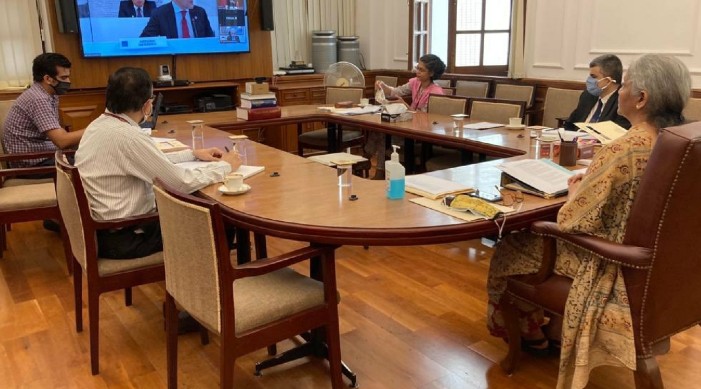G20 members have reaffirmed their resolve to use all policy tools for as long as required
Referring to the global risks in view of the emerging COVID-19 variants, Indian Finance Minister Nirmala Sitharaman has highlighted the need for international coordination and cooperation on this front.
Addressing the two-day G20 Finance Ministers and Central Bank Governors Meeting held on Thursday and Friday, Sitharaman appreciated the Italian G20 Presidency for identifying three catalysts of resilient economic recovery from the pandemic.
Referring to these catalysts of Digitalization, Climate Action and Sustainable Infrastructure, she shared the Indian experience of integrating technology with inclusive service delivery during the pandemic.
The G20 Finance Ministers and Central Bank Governors reaffirmed their resolve to use all available policy tools for as long as required to address the adverse consequences of COVID-19, according to a statement of the Ministry of Finance.
The meeting saw discussions on a wide range of issues including global economic risks and health challenges, policies for recovery from the CoVID-19 pandemic, international taxation, sustainable finance and financial sector issues.
Finance Minister Sitharaman shared recent policy responses of the Government of India to strengthen the health system and economy, including the efficient application of CoWIN Platform to scale-up vaccination in India.
Sitharaman added that this platform has been made freely available to all countries as humanitarian needs outweigh commercial considerations in this extraordinary crisis.
The Finance Minister stated that as the co-chair of Framework Working Group of the G20, India along with UK, views digitalization as an agenda that will continue to play a key role in bolstering economic growth.
The Finance Minister joined other G20 members in welcoming the Report of the G20 High-Level Independent Panel on Financing the Global Commons for Pandemic Preparedness and Response and emphasized on the urgent need to strengthen multilateralism for global health.
Sitharaman shared her insights on the Italian Presidency’s ongoing work on a roadmap to guide sustainable finance.
Speaking on the need for aligning recovery strategies with climate concerns, the Finance Minister called for climate action strategies to be based on the principles of the Paris Agreement and noted the criticality of timely fulfilment of international commitments on climate finance and technology transfer.
Regarding the “Statement on a two-pillar solution to address the tax challenges arising from the digitalisation of the economy” released by the OECD/G20 Inclusive Framework on Base Erosion and Profit Shifting (BEPS-IF) on July 1st, the G20 Finance Ministers called on the OECD/G20 BEPS-IF to swiftly address the remaining issues.
Sitharaman suggested that further work needs to be done to ensure a fairer, sustainable and inclusive tax system which results in meaningful revenue for developing countries.
 Contact Us
Contact Us  Subscribe Us
Subscribe Us









 Contact Us
Contact Us
 Subscribe
Subscribe
 News Letter
News Letter

